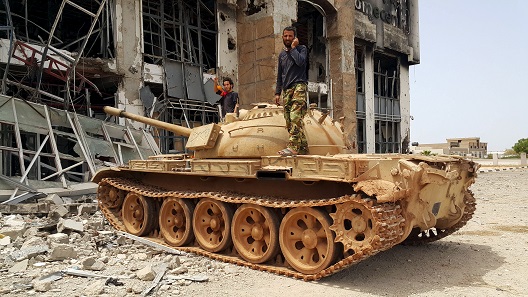 While the Islamic State (ISIS, ISIL, Daesh) has been routed out of its Libyan stronghold in the city of Sirte, the 2017 Manchester bombing, which was perpetrated by a duel British and Libyan citizen, demonstrated that Libya remains a fertile ground for ISIS and other extremist groups. On June 20, 2017, the Rafik Hariri Center for the Middle East launched a new report, The Origins and Evolution of ISIS in Libya, authored by Jason Pack, Rhiannon Smith, and Karim Mezran. The report examines ISIS’s pre-history, birth, expansion, consolidation, and dispersal in Libya, as well as the broader political context of the country.
While the Islamic State (ISIS, ISIL, Daesh) has been routed out of its Libyan stronghold in the city of Sirte, the 2017 Manchester bombing, which was perpetrated by a duel British and Libyan citizen, demonstrated that Libya remains a fertile ground for ISIS and other extremist groups. On June 20, 2017, the Rafik Hariri Center for the Middle East launched a new report, The Origins and Evolution of ISIS in Libya, authored by Jason Pack, Rhiannon Smith, and Karim Mezran. The report examines ISIS’s pre-history, birth, expansion, consolidation, and dispersal in Libya, as well as the broader political context of the country.
Pack, the founder and director of the not-for-profit Eye on ISIS in Libya, emphasized the flexibility of jihadi groups like ISIS, specifically their ability to evolve and mutate over time in response to circumstances. ISIS may have been expelled from Sirte, he explained, but the group retains a presence in the south of the country and will continue to adapt even after such defeats. Jihadi groups like ISIS are mutable because of underlying theological origins and personal ties; they are not organized or divided by specific ideologies or beliefs. This provides ISIS and other jihadist groups in Libya with an advantage and demonstrates why a member of an al-Qaeda affiliated group may join ISIS in Libya. By pledging allegiance to local Libyan leaders, Pack said, jihadists become connected to a much larger network that transcends individual movements. Allegiance is therefore local, rather than ideological, and more fluid.
Smith, Managing Director of Eye on ISIS, agreed with Pack that ISIS’s flexibility and adaptability strengthen the group, but she went on to press that the essence of ISIS is foreign to most Libyans. The group’s techniques of violence and brutality does not resonate with Libyans, most whom do not support ISIS.
The discussion also focused on the issue of poor governance in Libya, which created a stateless vacuum that was filled by ISIS. Pack explained that ISIS capitalized on this vacuum in Sirte by responding to marginalized Libyans’ needs in the city as a mechanism to gain territory and control. Smith added to this analysis and noted that ISIS’s presence in Libya is a symptom of the country’s statelessness rather than the cause of the country’s problems. The continued instability in Libya means that ISIS will not disappear overnight in the country.
On US policy in Libya, Pack said that the United States should not focus solely on counterterror efforts. He acknowledged the importance of counterterror efforts and said the United States should deploy a small group of special operations forces to work alongside local actors towards security. However, the United States also needs to support targeted capacity-building programs at local governance areas, such as to local councils. He advised against approaching Libya with a zero-sum mentality, arguing that the US can have an influence on the ground in Libya even through smaller scale state-building efforts.
Associate Director and Senior Political Scientist Christopher Chivvis at the RAND Corporation, spoke about the failure of post-conflict reconstruction in Libya and agreed with Pack and Smith that statelessness opened the door for jihadist groups and ISIS. However, he warned that a bottom-up approach to Libya may not work, as the US government is reluctant to work with local actors and prefers to work on a state to state level. He said the ultimate solution will be state-building at the national level, something in which the United States government is reluctant to engage.
Chivvis explained that US policy in Libya so far has been to occasionally intervene militarily to keep ISIS in check, rather than pursue long term-solutions like state-building efforts or local governance support.
Actors in Libya will not stop vying for territory and power until they believe a balance of power has been reached, Chivvis said, adding that the United States should wait for some level of stability to be stablished before engaging in state-building efforts. The eviction of ISIS from Sirte will make the fight more challenging as it goes underground; national and local governance will be essential in the fight against the group.
Ultimately, all three panelists agreed that Libya needs a simultaneous effort to support local councils and build more effective national governance institutions. In the absence of good governance, it is clear that groups like ISIS will continue to exploit Libya as both a potential base and a launching pad for attacks.
Image: Photo: Members of the Libyan pro-government forces stand on a tank in Benghazi, Libya, May 21, 2015. Libya, which has descended into near anarchy since NATO warplanes helped rebels overthrow former dictator Muammar Gaddafi in a 2011 civil war, is now the third big stronghold for Sunni Islamist group Islamic State, also known as ISIS or ISIL, which declared a Caliphate to rule over all Muslims from territory it holds in Syria and Iraq.
